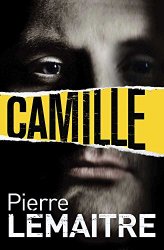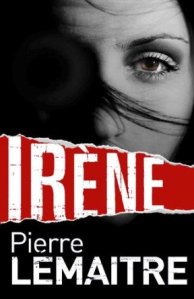The Intel: Pierre Lemaitre
 We like Pierre Lemaitre here, but you may have guessed that—we like his tightly-plotted, quick-witted novels featuring the diminutive detective Commandant Camille Verhoeven. Lemaitre is the author of Alex, Irene and most recently concluded —or perhaps hasn’t—his trilogy about Verhoeven, with Camille. We recently reviewed Camille —and, if you’re tall enough to reach the mouse, you can click here to see it.
We like Pierre Lemaitre here, but you may have guessed that—we like his tightly-plotted, quick-witted novels featuring the diminutive detective Commandant Camille Verhoeven. Lemaitre is the author of Alex, Irene and most recently concluded —or perhaps hasn’t—his trilogy about Verhoeven, with Camille. We recently reviewed Camille —and, if you’re tall enough to reach the mouse, you can click here to see it.
Lemaitre worked for many years as a teacher of literature and now devotes his time to writing novels and screenplays. With Alex he won the CWA 2013 International Dagger Award and he was awarded the 2013 Prix Goncourt, France’s most prestigious literary award, for Au revoir là-haut,his epic about World War I.
We’ve long wanted to talk to Lemaitre, there’s been a big, gaping hole in the Intel Interviews until now, so we’re delighted that he’s agreed to talk to us about Camille, why he’s not nice to his characters and how, if you’re looking for advice about writing, you’re on your own…
How does Camille differ from its predecessors Alex and Irene?
CAMILLE is the final part of a trilogy, describing the destiny of a man (Camille) through those of three women (Irene, Alex and Anne). This novel does not resemble its predecessors, because the narrative is very different, but I imagine a reader who has followed this character since the beginning would want to know how his story ends.
The seeds for this final book are planted in the previous volumes - did you plan the trilogy in its entirety at the beginning?
No. Camille was not meant to be a recurring character. I wrote two other crime novels after IRENE, which did not involve detectives, but when I found myself confronted by Alex, and indeed every time I needed a police officer, Camille was always knocking on my door, in a fairly friendly way. As you know, he’s someone who has had to deal with a lot of problems in his life, so it was difficult to turn him down…
 Camille Verhoeven is one of the most-singular protagonists in crime fiction - where did you get the inspiration for him?
Camille Verhoeven is one of the most-singular protagonists in crime fiction - where did you get the inspiration for him?
I wanted a detective who would view the world in a slightly different way to other people. His height makes him see everything from a low-angled shot, which is unusual, and makes him view life from a different perspective to other men. Moreover, I wanted this character to be a tribute to painting, and Dutch painting in particular. I therefore created a man who thought with his hands as much as his brain: he only really understands what he can paint, because painting is a form of expressing the way he contemplates different problems.
Is it true that there’s a fourth book in your trilogy?!
Yes, it’s a book with the French title of Rosy & John - I’m very proud of it. It will be published in English as I have an excellent UK publisher, who is planning to publish all my books.
You’re a great connoisseur of crime fiction. How do French writers differ from their British or American counterparts, do you think?
It’s quite difficult to say in a few words. I think that, (very generally) French authors spend more time on the question of the atmosphere of the novel (doubtless a legacy of Simenon) and they are perhaps more willingly concerned with political problems than social ones.
What’s the hardest lesson you ever had to learn about writing?
It is a lesson that is probably just as difficult for my characters as it is for me. When I was writing my second novel, I was unhappy with it from the very beginning. I re-wrote a lot, and then corrected it again - but it still didn’t work, and finally I came to understand that I had been too sparing with my main character, (a delightful young woman, who I didn’t want to suffer too much). I remembered a lesson from Jean Cocteau: “to amuse the gods, man must fall to earth.”
I realised that I loved my character, but that you can’t write a good crime novel with such sentiments; so I had the head of my main character held under water until she was almost dead – and straightaway the book was much better. I do have a reputation of not being terribly nice to my characters. I’ll let you be the judge of that.
 Give me some advice about writing…
Give me some advice about writing…
No, everyone must find their own method, their rhythm. Maybe good advice would be to make yourself happy first of all because a reader can tell if a book has been written with an enjoyment that the author wants to share.
And if I knew how to write good books, I’d keep the recipe to myself!
What’s next for you?
I’m planning to write a TV series, roughly 8 or 10 episodes long, about a crime that takes place in modern-day Paris. I hope I will be able to tell you more in a few weeks…

